 The first list of its kind for science, The Eureka 100: The Science List by The Times last week aimed to identify the 100 most important people in British science. The unenviable task of four panellists (William Waldegrave, Athene Donald, Alice Bell and Evan Harris) was not only to decide who should make the shortlist but then to put them into some sort of order and work out a ranking!
The first list of its kind for science, The Eureka 100: The Science List by The Times last week aimed to identify the 100 most important people in British science. The unenviable task of four panellists (William Waldegrave, Athene Donald, Alice Bell and Evan Harris) was not only to decide who should make the shortlist but then to put them into some sort of order and work out a ranking!
The sheer variety of fields and specialities that the term science covers must have made this an almost impossible task. As James Harding (Editor of The Times) says in his introduction:
‘How can you say who is more important, a particle physicist or a molecular biologist? Who matters more, a geneticist striving to find cures for cancer or a geophysicist seeking to address climate change?'
The Society of Biology was quick to point out that biologists scooped 40 of the top 100!
So the list was drawn up, and includes familiar faces, eminent researchers, and some unexpected names including a chef and a royal! Here at Understanding Animal Research we were keen to see how the final list shaped up.
Two prominent animal research advocates Nancy Rothwell and Colin Blakemore made the cut, ranked at number 10 and 64 respectively. Professor Rothwell, who became the first female President (and Vice Chancellor) of the University of Manchester this year, has always been a voice for animal research. She was especially vocal about why animal research was vital to science ‘at a time when many scientists and experts were fearful of recriminations by animal rights extremists'. She continues to lead the field on how brain cells are damaged in diseases such as Alzheimer's.
Colin Blakemore, former head of the Medical Research Council, and current professor at Oxford and Warwick, has endured numerous campaigns against himself and his family by animal rights extremists during his career. However, he has continued his vital research in neuroscience throughout, and has always been a strong voice advocating of the need for animal research.
Also in the list were two Nobel Prize winners: Sir Martin Evans, who isolated embryonic stem cells for the first time which led to the creation of ‘knockout mice'; and Tim Hunt who discovered the cyclin family of proteins in his work on sea urchin eggs. Greg Winter also makes the top 100; he showed that monoclonal antibodies could be produced in mice and used for medical benefit.
From the search for new cancer treatments, to IVF and even the development of Viagra, animals have been inextricably linked to developments in medicine and science. Many of the scientists on the list will at some stage have been involved in research involving animals or animal materials.
The top 100 list also included a ‘top 10' of animals used in testing (ranked by number used), with mice, fish and rats topping the bill, and sheep and beagles coming in at numbers nine and ten. There was also a list of the top three science beards, but we wouldn't want to give everything away...!
Last edited: 7 April 2022 13:13



